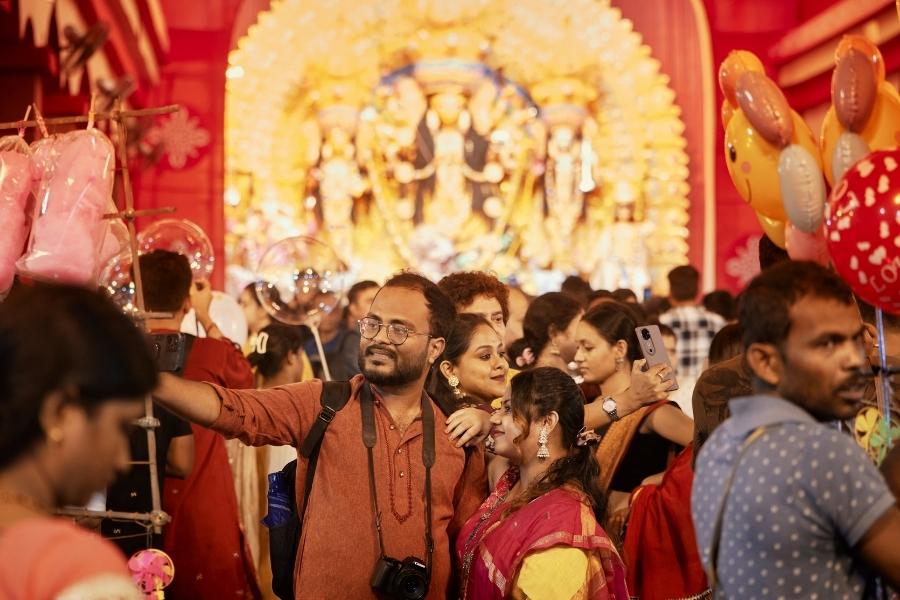For most Bengalis, Durga Puja rings a bell that instantly reminds us of the hustle of pandal-hopping, endless adda sessions, and soaking in the festive lights. But what is synonymous with joy for the majority of Kolkatans isn’t the same for others.
Some find the idea of braving the crowd at pandals, the piercing sound of whistles hitting the ears, the scorching heat and walking for hours more exhausting than joyous. Many of them prefer to spend the four festive days recharging — be it with good food, quality family time, or catching up on books, movies or video games that they otherwise would miss out on.
While the entire city beams with excitement for the festive season, My Kolkata reached out to individuals who took us through why they choose solitude over chaos during Puja — and whether FOMO ruins the peace.
‘The chaos outside is nerve-wrecking’
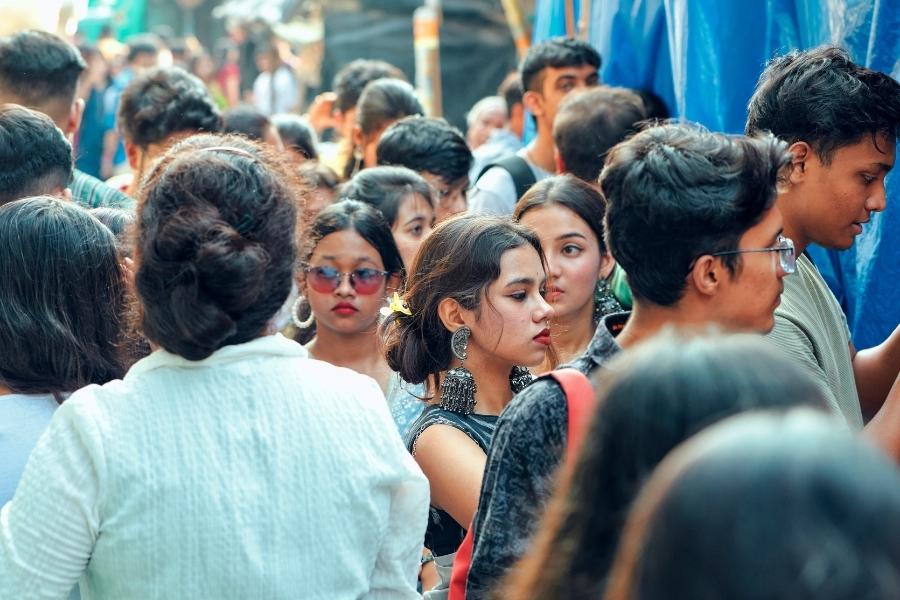
Durga Puja takes on a different meaning in adulthood. The thrill of a whole night’s pandal-hopping is often replaced by a craving for peaceful moments. And for those living away from Kolkata, the yearning to spend the festival wrapped in the comfort of family is what changes the idea of enjoyment.
Subhrajit Biswas, 32, who currently lives in Bangalore, looks forward to spending Durga Puja with his parents at home when he visits Kolkata.
“These days, I feel the festival has turned into a spectacle. Of larger-than-life pandals, advertising, and overwhelming crowds. The chaos is nerve-racking,” he said. “I find joy in spending the four days of Durga Puja at home with my parents. My mom prepares all the dishes I request, and my dad and I catch a good cricket match on TV if there’s one on.”
Biswas said he doesn’t miss the festive spirit even though he refrains from the frenzy. Besides cherishing family time, he enjoys watching his neighbourhood decked up with lights and listening to the dhaak beats from the local pandal from his balcony.
For Biswas, trading the chaos for peace doesn’t mean missing out. “There’s something comforting about the utsav. A peaceful stay at home feels truly relaxing, and I never feel left out,” he added.
‘Tired of people asking why I don’t take leaves during puja’
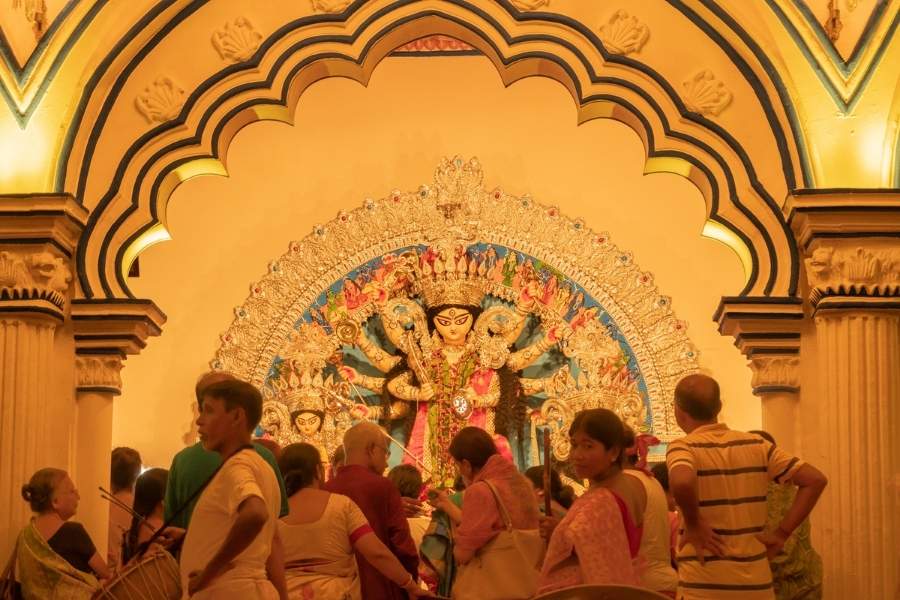
Learning to become comfortable in one’s own skin is an art in itself, and some, like Ishan Adhikary from Nadia, have made peace with spending puja alone. It’s not about avoiding the crowded pandals. It’s about enjoying their own company.
As a child, Ishan loved stepping foot outside during Durga Puja, cycling, visiting gaming cafes and meeting school friends for pandal hopping. However, as he grew older, things changed for the 26-year-old.
“Now, I just stay inside, eat food or maybe have a few drinks and play video games alone. Not having friends doesn’t bother me anymore. I’m happy in this solitude and have accepted that the privilege of celebrating Durga Puja is not for everyone,” he said.
“I'm tired of everyone asking why I don’t take leaves on Durga Puja,” the Palpara resident quipped.
When it comes to enjoying one’s solitude during the festival, Ishan is not alone. Siddhanta Chandra, 23, from New Barrackpore, sees it as a golden opportunity to slow down and savour the things that he otherwise wouldn’t get the chance for the rest of the year.
“I mostly enjoy the peace at home, the comfort of my room, the RGB lights on my PC while gaming and my mother cooking up mutton and rice — my favourite dish cooked by her. I don’t want to trade the peace I have for the chaos outside,” he shared.
‘Maybe I’d like pandal-hopping if it wasn’t so crowded’
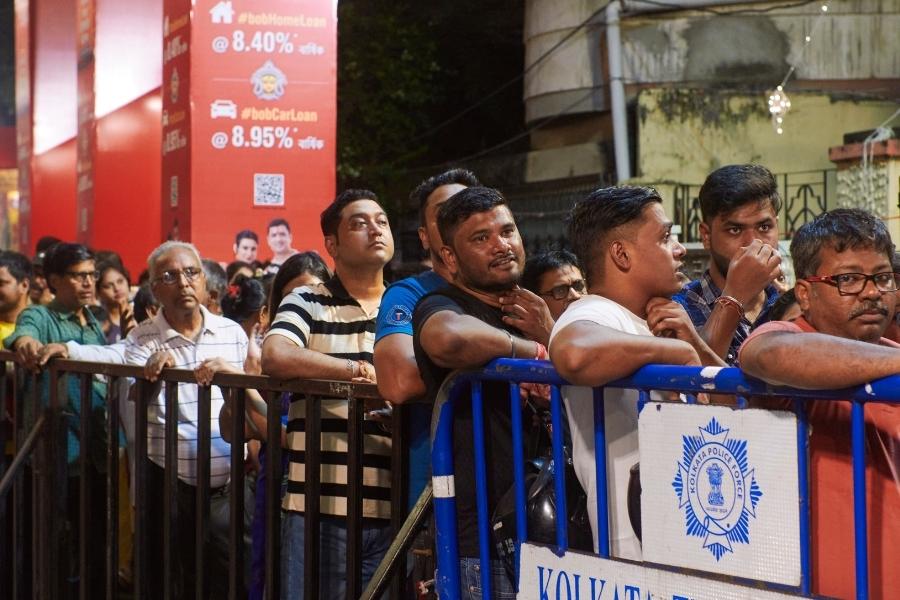
“Maybe if the pandals weren’t so crowded and people didn’t push around, I would enjoy going out during puja,” said 19-year-old Ahana Bagchi. For the Jadavpur University student, the idea of puja is more fascinating than the experience of hopping from one pandal to another.
“The way people get pushed in the pandals is way too suffocating,” she said. Instead, she spends her holidays watching movies, reading, eating good food, and catching up on sleep.
“I don’t feel left out when my friends go pandal-hopping. If I say no, it just means I wanted to stay in and relax. It’s better than agreeing to plans and cancelling them last minute,” she added.
Grief, breaking traditions and finding a new anchor
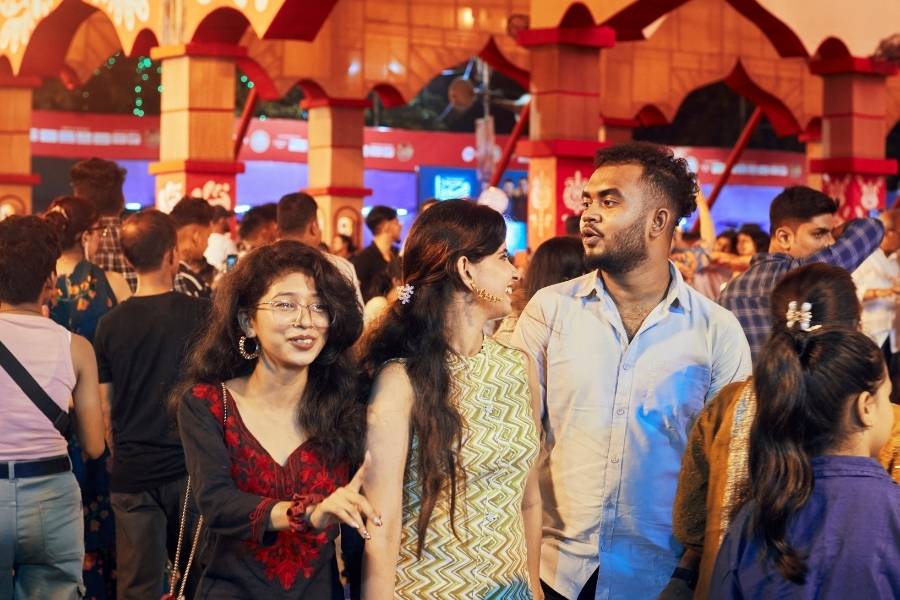
Grief has a habit of turning lives upside down, for better or worse. Sometimes, life-long traditions die in the wake of tragedies, and for Sayantika Biswas, puja celebrations changed after the COVID-19 Pandemic.
“During COVID, we lost a lot of close family members with whom we used to spend Puja. The family unity we looked forward to is kind of gone,” the Rajarhat resident opened up with a tinge of sadness in her voice.
What was once a ritual during the festive season, soon turned into something entirely different. Sayantika’s family now prefers a mix of staying at home and going on vacations as living in the city reminds them of their past suffering.
“Till Sasthi or Saptami, we stay home and spend time together — just the three of us — talking about old memories and reconnecting with each other. Then we travel to other cities and explore the festivals there, meet new people, and experience something new. It feels like an escape,” she said.
Yet, she admits that seeing friends and relatives celebrating the festival together on social media make her long for that happiness. “I feel bad at times, but mostly, I feel happy to be in my own solitude and with my parents,” added the 22-year-old.
Expert’s take on overstimulation and FOMO during Durga Puja
Choosing quieter evenings at home or low-key celebrations is not avoidance — it’s often a healthy way of preserving emotional balance and honouring one’s own limits, explained Rimpa Sarkar, a Mumbai-based clinical psychologist.
“FOMO during Durga Puja often stems from emotional associations with loved ones and traditions. Social conditioning plays a big role too, since the festival is deeply tied to community participation — stepping back can feel like breaking tradition. Social media often intensifies these feelings by constantly showing others’ experiences,” she said.
Constant stimulation keeps our ‘fight-or-flight’ system active, heightening stress and anxiety rather than relaxation, she mentioned. Her advice? “Strike a balance — maybe join for a special day like Ashtami, while giving themselves permission to rest on other days.”
The key is reminding oneself that opting for peace is not missing out, it’s choosing well-being, Sarkar signed off, highlighting the importance of finding peace within oneself which is a celebration in its own right.
